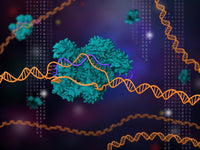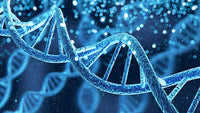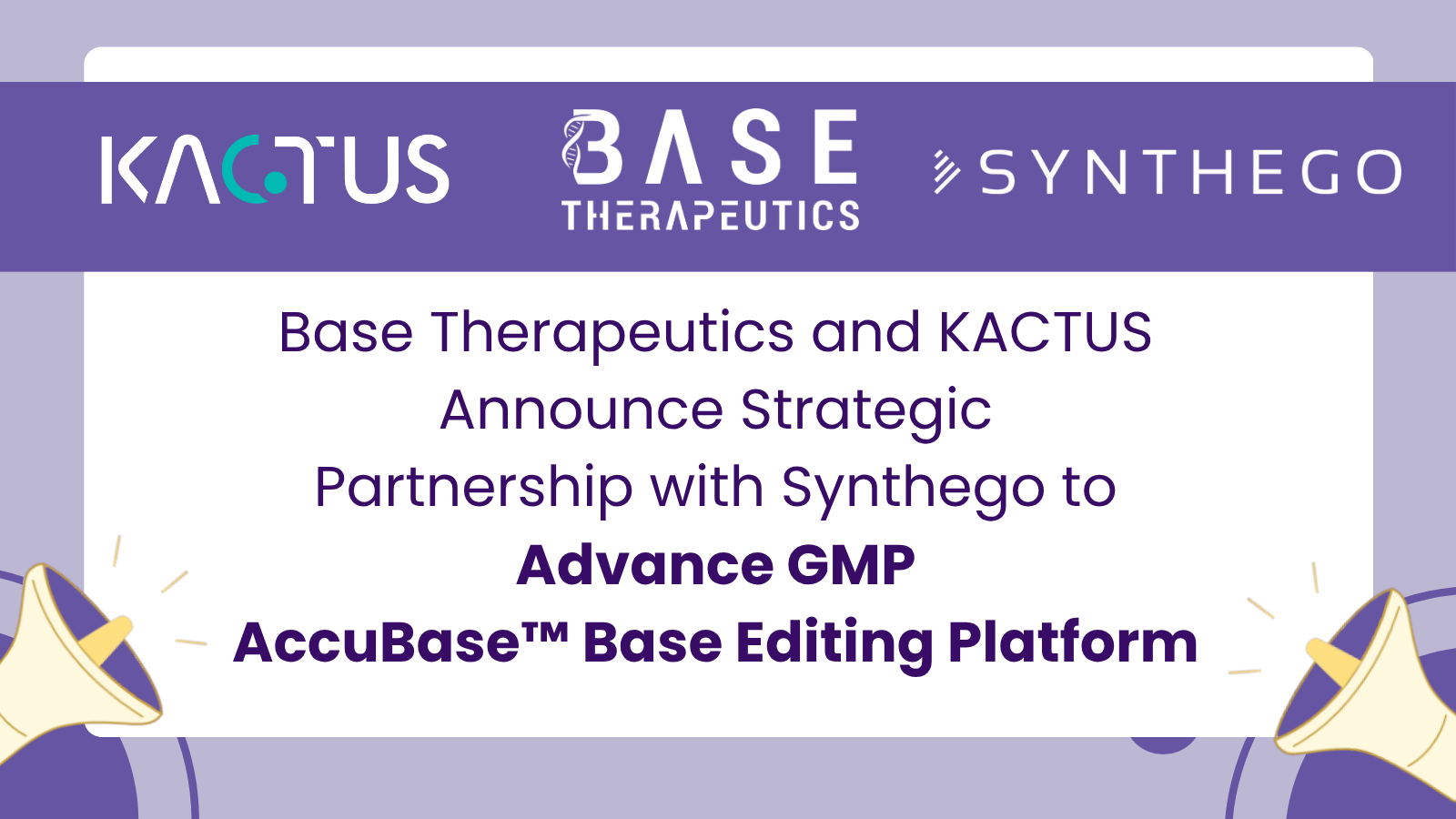Global Release of the First Commercial Base Editor on the Market: AccuBase™
By Mallory Griffin
KACTUS and Base Therapeutics announced their new strategic partnership to facilitate global manufacturing and sales of the GMP-grade base editor AccuBase™. This is the first commercially available base editing enzyme (base editor) and offers comparable performance published benchmark base editors but with low-to-zero off-target effects in gene editing. By combining their strengths in research and development on gene editing tools, recombinant protein expression, and GMP manufacturing, the two parties will provide this off-the-shelf GMP-grade base editor tool to global biopharmaceutical customers, thereby jointly promoting the development of the gene and cell therapy field.
What is AccuBase™?
AccuBase™ is a base editing enzyme developed through genetic engineering and is also the world's first commercially available GMP-grade base editor. It creatively encapsulates the deaminase in a reversible manner to avoid random binding to the non-target sites, which greatly reduces off-target events while maintaining high gene editing efficiency. Based on its unique Structure Aided Design and Multiplex Screening (SAMS™ ) protein engineering platform, the technical team at KACTUS successfully screened and optimized the process of protein expression, purification, and formulation for AccuBase ™ base editor, ultimately manufacturing the base editing enzyme with high stability, high purity, and high activity. For base editors or other gene editing proteins requiring tailored expression systems to optimize performance, custom protein expression services can support specialized production and development workflows.
What are base editors?
Base editors are a class of engineered proteins that can be used to perform direct, irreversible conversion of one DNA base pair into another, at a specific location in the genome, without making a double-stranded break in the DNA. These enzymes are derived from a combination of CRISPR-Cas9 technology and other enzymes. They use a deactivated Cas9 (dCas9) or a Cas9 nickase (nCas9) fused to a base-modifying enzyme called deaminase. Depending on the type of fused deaminase, base editors can be classified into 1) Cytosine base editors (CBEs), which convert cytosine (C) to uracil (U), or 2) Adenine base editors (ABEs), which convert adenine (A) to inosine (I).
Compared to traditional CRISPR-Cas9 editing, base editing does not require double-stranded DNA breaks, reducing the chances of creating insertions or deletions (indels) and other chromosomal rearrangements that can occur with standard CRISPR-Cas9 editing. Therefore, base editing is more efficient and has fewer unwanted off-target effects.
Base editors are increasingly being used for various applications in research, medicine, and biotechnology, including the treatment of genetic diseases, the development of disease models, and improvements in crop genetics. However, there are still challenges to overcome, including improving the specificity of base editors and minimizing any unintended DNA edits.
Statements from Base Therapeutics and KACTUS
Dr. Tianhong Xu, CEO of Base Therapeutics, stated: "KACTUS is a highly-recognized and trusted company within the biotech industry. Its unique recombinant protein R&D research technology platform and GMP-grade manufacturing system can provide significant quality assurance for base editors. We believe our collaboration with KACTUS can fully leverage our advantages to guarantee a smooth transition from bench to production, empowering the cell and gene therapy development."
Mr. Edmund (Gang) Wang, CEO of Kactus, said: "Cell and gene therapy is one of the most promising therapeutic approaches at present. Base Therapeutics possesses its own intellectual property rights and editing tools with high accuracy and efficiency that can achieve precise single-base editing, bringing more therapeutic solutions for disease treatments. We hope our collaboration can provide more tool options for gene editing researchers and companies in the CGT field and advance the research and industrialization of cell and gene therapy."
About Base Therapeutics
Base Therapeutics was founded in April 2021, specializing in the research and development of novel gene-editing NK cell therapy and gene therapy products. They have developed the patented AccuBase base editing system, which has global Freedom To Operate (FTO) and can achieve highly efficient gene editing both in vitro and in vivo with zero off-target effects. In addition, they have developed ePE, a highly efficient prime-editing technology. Based on these proprietary foundational technologies, Base Therapeutics focuses on developing First-in-Class BED-NK and BEAT-CAR-T product pipelines, as well as multiple in vivo base editing product lines. The BED-NK product class has overcome the two major challenges of NK cell ex vivo expansion and genetic modification and completed proof of concept, aiming to initiate IND filings in China and the US by the end of 2023. The AccuBase gene editing technology has already collaborated with several leading international pharmaceutical companies, licensing them to develop applications in corresponding fields.
About KACTUS
KACTUS was founded in 2018 and is a company focused on the upstream sector of the biopharmaceutical industry, driven by independent innovation and specializing in the production of enzymes for CGT manufacturing. Relying on its unique protein research and development platform, SAMS™, KACTUS has entered the antibody drug market from the challenging field of transmembrane proteins and, with its high-quality products, expanded into the fields of cell and gene therapy as well as RNA therapy, committed to addressing unmet market demands.
In the field of gene therapy, KACTUS provides localized GMP-grade Cas9 enzymes that meet the clinical needs of gene editing. KACTUS also supplies GMP-grade MaxNuclease for AAV and vaccine research, MHC complexes for cell therapy, and enzymes for GMP manufacturing of mRNA. KACTUS has filed multiple GMP-grade enzyme products with the FDA Drug Master Files (DMF). KACTUS’ GMP products are strictly tested and validated according to pharmacopeia methodologies and are equipped with an MES digital production management system, ensuring high batch-to-batch consistency and strict compliance with regulatory submission requirements.
KACTUS has a professional technical team of nearly 200 people, a 10,000 square-meter GMP-grade enzyme manufacturing facility, and a 5,000 square-meter R&D facility and operates on a global scale.
Contact Us
Interested in AccuBase? Contact our team at support@kactusbio.us










